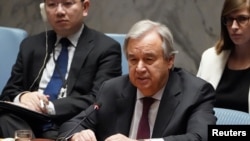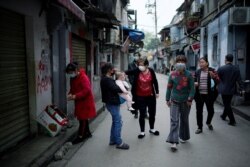The U.N. secretary-general warned Thursday that the world body was facing its “gravest test” since its founding 75 years ago, as the coronavirus poses a threat to global peace and security, as well as health.
“The pandemic also poses a significant threat to the maintenance of international peace and security — potentially leading to an increase in social unrest and violence that would greatly undermine our ability to fight the disease,” Antonio Guterres told a closed-door meeting of the U.N. Security Council, according to the text of his remarks.
Thursday marked 100 days since China informed the World Health Organization that it was dealing with cases of what would later be identified as COVID-19, the disease caused by the coronavirus. It has taken this long for the 15-nation council to overcome differences and hold a meeting on the virus, which has ravaged the globe, sickening nearly 1.6 million and killing more than 95,000 people as of Thursday evening, according to the Johns Hopkins University Coronavirus Resource Center.
The council’s 10 elected members called for the session to take place and the secretary-general was asked to brief members on how the pandemic has impacted the organization’s peacekeeping, humanitarian and political work.
“The engagement of the Security Council will be critical to mitigate the peace and security implications of the COVID-19 pandemic,” Guterres told council members during the videoconference. “We all recall the crucial role the council played in marshaling the international community’s response to the security implications of the HIV/AIDS crisis and the Ebola outbreak.”
Guterres came with a lengthy list of concerns.
“First, the COVID-19 pandemic threatens to further erode trust in public institutions, particularly if citizens perceive that their authorities mishandled the response or are not transparent on the scope of the crisis,” Guterres said.
He also warned that the economic fallout from the crisis could further stress fragile societies and less developed nations.
COVID-19 could also impact elections and referenda, igniting political tensions. It could also lead to or worsen human rights challenges.
And in countries in conflict, he said he worried that spoilers could exploit the virus to sow further division and chaos. The health crisis has also stalled peace processes and impeded conflict resolution efforts on the local, regional and international levels.
“This could lead to an escalation of violence and possibly devastating miscalculations, which could further entrench ongoing wars and complicate efforts to fight the pandemic,” he said.
The U.N. chief warned that terrorists might seek to use the pandemic to attack governments either through conventional or even biological means, while they are focused on combating the virus.
On March 23, Guterres issued a call for an immediate global cease-fire to help focus efforts on fighting the virus.
“From South America to Africa and from the Middle East to Asia, we have seen conflict parties take some initial steps to end violence and fight the pandemic,” he said.
On Wednesday, the Saudi-led coalition became the latest party to answer the call, announcing a two-week unilateral cease-fire covering all of Yemen.
The virus is also impacting the U.N.’s peacekeeping operations, forcing the suspension of troop and police rotations until the end of June. More troubling, Guterres said the cash-strapped organization would be able to fund those missions only through the end of June.
Humanitarians continue to work in the field, but their operations are also financially struggling. A $2 billion U.N. appeal to meet humanitarian needs in about 40 countries hard hit by the virus is less than a quarter funded.
In a statement after the meeting, council members expressed their support for the secretary-general‘s efforts concerning the potential impact of the pandemic and “recalled the need for unity and solidarity with all those affected.”






